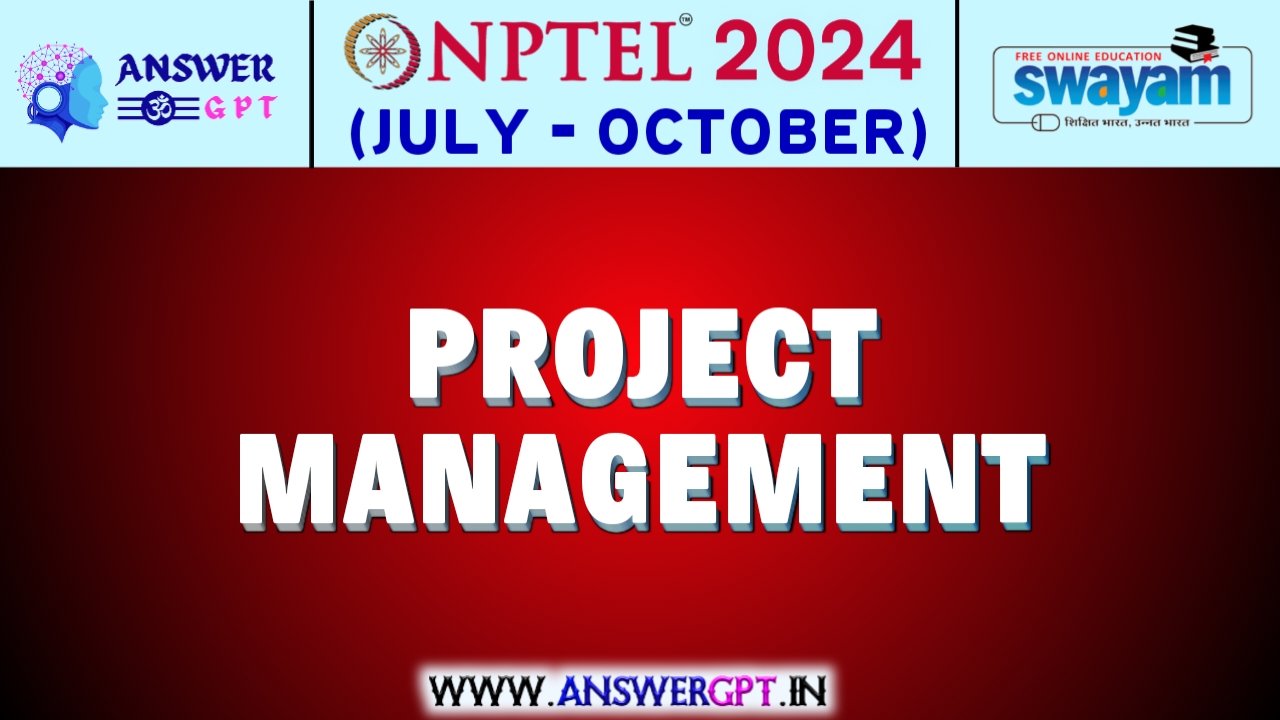Project Management Week 7 NPTEL Assignment Answers 2025
NPTEL Project Management Week 7 Assignment Answers 2024
1. Control is focused on three elements of a project. They are
- scope, quality, and customer satisfaction
- performance, delivery, and cost
- scope, cost, and time
- cost, time, and customer satisfaction
Answer: scope, cost, and time
Explanation: The triple constraints of project management are scope, cost, and time. These three elements are always in balance, and controlling them ensures successful project delivery.
2. Identify the item that is not one of the three types of control processes.
- cybernetic control
- robotic control
- go/no-go control
- postcontrol
Answer: robotic control
Explanation: The three types of control processes are cybernetic (automatic feedback), go/no-go (threshold-based), and postcontrol (after completion). Robotic control is not a recognized control process in project management.
3. The project audit covers
- only financial matters
- everything except operating matters
- only ethical and financial matters
- any specified scope of importance to management
Answer: any specified scope of importance to management
Explanation: A project audit can be tailored to cover any aspect that management considers important, such as schedule, budget, compliance, or performance — not just financials.
4. Two of the most common limits on the depth of an investigation and level of detail presented in an audit report are
- the personality of the auditor and cooperation received
- scope and objectives
- word processing support and existing documentation
- money and time
Answer: scope and objectives
Explanation: The extent of the audit is primarily defined by its scope and objectives, which determine what areas will be focused on and how detailed the investigation will be.
5. In order for an audit/evaluation team to be conducted with skill and precision, all of the following conditions must be met, except
- proper selection of the team
- setting a schedule convenient for the auditors
- accessibility of all records and files
- preservation of free contact with the project members
Answer: setting a schedule convenient for the auditors
Explanation: While logistics are important, setting a schedule just for the auditors’ convenience may compromise the quality and independence of the audit process.
6. _____________ is defined as a standard for performance, commonly established early on for later comparisons.
- Audit
- Baseline
- Evaluation
- Summary
Answer: Baseline
Explanation: A baseline is the original plan (scope, schedule, and cost) and is used as a reference point to measure project performance and progress.
7. The closure process is all of the following except which one?
- Always complicated
- Almost always inevitable
- Never easy
- Straight-forward
Answer: Never easy
Explanation: Although closure can be challenging, it is not necessarily always hard. With proper planning, it can be straightforward. “Never easy” is the incorrect option.
8. If a project is a major success and it is terminated by institutionalising it as a formal part of the parent organisation, this is an example of closure by
- closure by integration
- closure by addition
- termination by murder
- closure by starvation
Answer: closure by addition
Explanation: When a project becomes part of the organization as a regular activity due to its success, it’s termed closure by addition. Closure by integration refers to merging outcomes into the organization, while addition means creating a new unit.
9. Which of the following is not a common task for a closure manager?
- ensuring completion of the work
- redistributing personnel materials, and equipment
- communicating with all stakeholders why the project was terminated
- overseeing the closing of the project’s books
Answer: communicating with all stakeholders why the project was terminated
Explanation: This task is typically handled by project sponsors or senior management. The closure manager focuses more on execution tasks like finalization, resource allocation, and documentation.
10. The fundamental purpose of the final project report is to
- devote more resources to the project
- finish the work so that payment can be collected
- improve future projects
- document the errors in the project
Answer: improve future projects
Explanation: The final report provides lessons learned and recommendations to enhance performance in future projects. It’s not just about closing the current one but contributing to organizational learning.



![[Week 1-8] NPTEL Project Management Assignment Answers 2024](https://answergpt.in/wp-content/uploads/2024/02/NPTEL-Project-Management-Assignment-Answers-2024.jpg)


